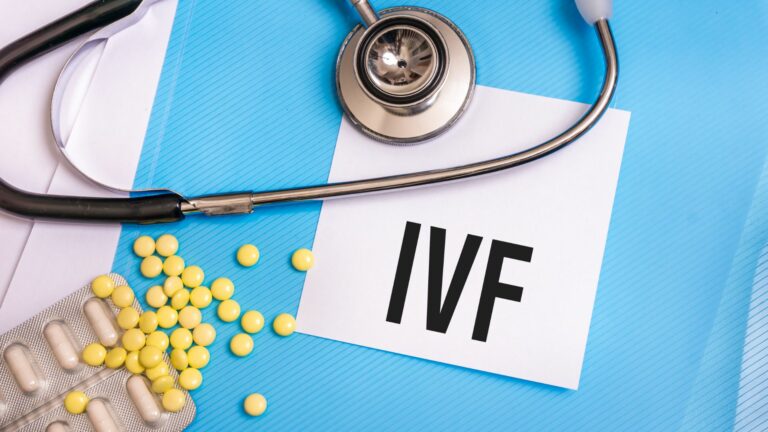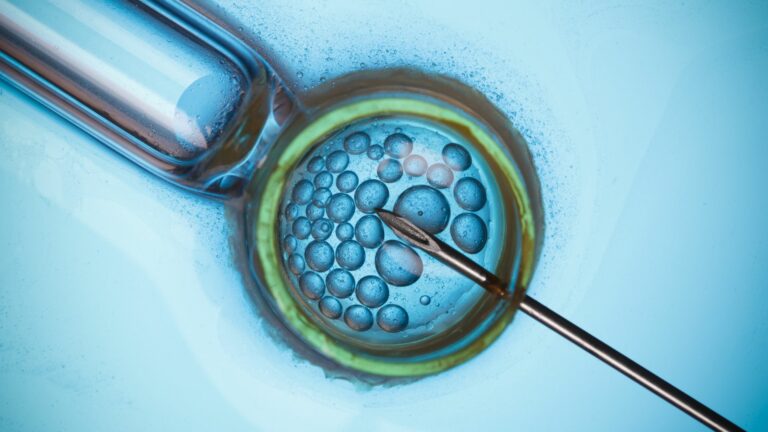
Introduction: Battling Infertility in India with IVF
Infertility is an increasingly prevalent issue among couples across India, affecting about 10-14% based on data from The World Bank.
A significant contributor to female infertility, affecting up to 40% of cases, is the presence of blocked fallopian tubes.
This condition hampers the natural process where an egg and sperm meet in the fallopian tubes for fertilization.
In light of these challenges, In Vitro Fertilization (IVF) has emerged as a pivotal solution.
IVF circumvents the natural process by retrieving eggs directly from the ovaries, fertilizing them in a lab, and implanting the embryos back into the uterus.
This breakthrough technology offers hope and a realistic path to parenthood for many couples.
Key Takeaways
| Fact | Detail |
|---|---|
| Infertility Rate in India | 10-14% of couples |
| Contribution of Blocked Fallopian Tubes | Up to 40% of female infertility cases |
| IVF Success Rates | Significantly higher than tubal repair surgeries |
Understanding Blocked Fallopian Tubes: Causes, Symptoms, and Diagnosis
Blocked fallopian tubes, often unnoticed due to their asymptomatic nature, primarily impede the egg and sperm from meeting, thus preventing natural conception. Several factors can lead to this condition:
Causes of Blocked Fallopian Tubes:
- Pelvic Inflammatory Disease (PID): A leading cause, stemming mainly from STIs such as chlamydia and gonorrhea.
- Endometriosis: Where tissue similar to the uterine lining grows outside the uterus, leading to blockages.
- Previous Pelvic Surgeries: Surgeries like appendectomies or C-sections can cause scar tissue that blocks these tubes.
- Tuberculosis: Less common yet a significant contributor in India.
Recognizing the Signs: Symptoms
Due to their subtle nature, blocked fallopian tubes don’t usually manifest prominent symptoms. However, some indicators might include:
- Pelvic pain, notably during menstruation or ovulation.
- Irregular or unusually painful periods.
- Challenges in conceiving, which often leads couples to seek medical advice.
Getting a Diagnosis
To accurately diagnose blocked fallopian tubes, medical professionals utilize:
- Hysterosalpingogram (HSG): An X-ray technique where dye is used to highlight the uterine and fallopian tubal structure.
- Diagnostic Laparoscopy: A more direct and detailed exploration using a camera inserted through a small abdominal incision, which offers a comprehensive look at the pelvic area and can directly identify blockages or other related issues.
These diagnostic tools not only confirm the presence of blockages but also guide the subsequent choice of treatment, ensuring couples receive the most appropriate care tailored to their specific needs.
Understanding the extent and location of the blockage is pivotal in deciding between pursuing reconstructive surgery or opting directly for IVF.
To learn more about the role of laparoscopy in diagnosing blocked fallopian tubes, consider reading more about blocked fallopian tubes and laparoscopy.
For more information on IVF and advanced maternal age in India, please explore IVF and advanced maternal age in India.
Treatment Options: Navigating Your Path to Parenthood
When dealing with blocked fallopian tubes, several treatment options are available.
Each has its own set of benefits and considerations, making it important for couples to discuss these thoroughly with their fertility specialist to choose the best path forward.
Hydrotubation
Hydrotubation is a treatment option involving the flushing of the fallopian tubes with a sterile fluid in an attempt to dislodge blockages.
This procedure can be appropriate for minor blockages and is performed as an outpatient procedure.
However, success rates vary and tend to be more favorable in less severe cases, generally ranging between 10-30%.
Surgical Repair (Tubal Reanastomosis)
For certain types of blockages, particularly where the damage is localized, surgical repair of the fallopian tubes can be considered.
This option is generally more suitable for younger women with a good ovarian reserve and where the blockage is not due to extensive scarring or previous infections.
Success rates for this type of surgery can range from 30-50%, but they diminish with factors like age and the extent of the damage.
In Vitro Fertilization (IVF)
IVF remains the most effective treatment option for blocked fallopian tubes. This method bypasses the fallopian tubes entirely.
Here’s a closer look at the IVF process:
- Ovarian Stimulation: Medications are used to encourage the ovaries to produce multiple eggs.
- Egg Retrieval: Eggs are collected directly from the ovaries in a minor surgical procedure.
- Fertilization: Retrieved eggs are fertilized with sperm in a lab. Techniques such as Intracytoplasmic Sperm Injection (ICSI) might be used if there are sperm-quality issues.
- Embryo Transfer: Healthy embryos are selected and transferred to the uterus, where they can implant and grow.
Considering the Cost of IVF
With the high effectiveness of IVF, it’s important to consider the financial aspect. IVF costs in India can vary significantly depending on the clinic and the specific treatments needed.
Choosing the Right Clinic
The choice of an IVF clinic can critically impact the success of the treatment. It’s advisable to research to find the best IVF clinic in India that suits your specific needs.
Success Rates and Factors Influencing IVF Outcomes
IVF success rates are generally encouraging, with younger women experiencing higher success levels.
However, several factors play a role:
- Age: The age of the woman is a critical factor; younger women typically see higher success rates.
- Ovarian Reserve: The quantity and quality of a woman’s eggs can significantly affect outcomes.
- Sperm Quality: The quality of the sperm used for fertilization is also crucial.
- Embryo Quality: Higher-quality embryos have a better chance of leading to a successful pregnancy.
- Underlying Health Issues: Conditions like endometriosis or pelvic inflammatory disease could lower success rates.
For individuals exploring their options, it might also be valuable to consider finding an IVF doctor in India who can provide personalized guidance and support throughout the process.
In our upcoming sections, we will delve deeper into navigating the IVF journey, including optimizing your chances of success and understanding additional services like egg freezing and donor egg screening.
Stay tuned to learn more about transforming your aspirations of parenthood into reality despite the challenges of blocked fallopian tubes.
Navigating Your IVF Journey: From Planning to Pregnancy
Embarking on an IVF treatment requires thoughtful preparation and informed decision-making to optimize the chances of success.
Here we discuss the steps potential parents can take to prepare both physically and mentally for the journey ahead.
Pre-IVF Counseling and Testing
Before starting IVF, it’s crucial to undergo comprehensive testing and counseling:
- Ovarian Reserve Testing: Evaluates the quantity and quality of eggs available for IVF.
- Uterine Evaluation: Ensures the health of the uterine environment for implantation.
- Semen Analysis: Assesses sperm count and quality, vital for successful fertilization.
- Genetic Screening: Preimplantation genetic screening (PGS) can help identify genetically healthy embryos, increasing the likelihood of a successful pregnancy and healthy baby.
Lifestyle Adjustments
Lifestyle factors play a significant role in the success of IVF:
- Diet and Nutrition: Eating a balanced diet rich in vitamins and minerals can support reproductive health.
- Exercise: Regular, moderate exercise can improve fertility by boosting overall health and reducing stress.
- Stress Management: Techniques such as yoga, meditation, or counseling can help manage the emotional stress associated with fertility treatments.
Emotional and Psychological Support
Fertility challenges can be emotionally taxing. Engaging in counseling or support groups can provide emotional resilience and a support network of people who understand the journey.
Exploring Supportive Services: Egg Freezing and Donor Eggs
Sometimes, additional services might be necessary or chosen to enhance the chances of IVF success:
- Egg Freezing: For women who wish to delay pregnancy, egg freezing in India offers a viable option to preserve fertility.
- Donor Eggs: When a woman’s own eggs are not viable for IVF, donor egg screening in India ensures healthy, quality eggs are used for fertilization.
IVF Success Stories: Inspiration and Hope
Hearing about successful IVF experiences can provide comfort and motivation. Many couples who once faced infertility due to blocked fallopian tubes now enjoy the joys of parenthood, thanks to advanced reproductive technologies.
Their stories can be a source of hope and encouragement for others on similar paths.
Conclusion: Your Path to Parenthood
Every couple’s journey to parenthood is unique, especially when navigating complexities such as blocked fallopian tubes.
With modern advancements in medical science, treatments like IVF offer a beacon of hope. By choosing the right medical team, preparing adequately, and maintaining a support system, couples can enhance their chances of success.
For those looking to start their IVF journey in specific locations, resources like IVF centers in Jabalpur provide localized assistance, ensuring that every couple can find guidance close to home.
Remember, the journey may be challenging, but the destination—a chance at parenthood—is worth every effort. Stay informed, stay hopeful, and let the science of fertility bring you closer to realizing your dreams.






